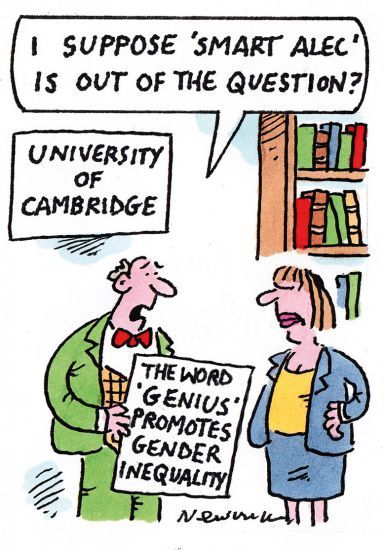
Lucy Delap, a lecturer in British history at the University of Cambridge, is the latest academic to set off the Daily Telegraph’s Oxbridge political correctness klaxon. In an article on 12 June, the newspaper quoted Dr Delap as saying that examiners at the institution had been told to avoid using words such as “genius” when assessing students’ work because they are associated with men and “carry assumptions of gender inequality”. “Flair” and “brilliance” are frowned on for the same reasons, Dr Delap said. “Some of those words, in particular ‘genius’, have a very long intellectual history where it has long been associated with qualities culturally assumed to be male,” she said. “Some women are fine with that, but others might find it hard to see themselves in those categories.” The historian Amanda Foreman described the move as being “well intentioned” yet insulting to women.
How many SparkNotes must one man quote before he is accused of plagiarism? The answer, my friend, is probably about 20, according to one US writer who found repeated similarities between lines in Bob Dylan’s Nobel prize lecture and the online study guide. In a piece for Slate on 13 June, Andrea Pitzer found that there were at least 20 sentences in the 4 June talk that resembled a SparkNotes entry on Moby-Dick – one of Dylan’s literary inspirations, which he described in detail over 78 sentences. For instance, Dylan says of the whale-hunting Captain Ahab that “he calls Moby the emperor, sees him as the embodiment of evil” – a phrase that does not appear in Herman Melville’s seminal novel but does in the online crib sheets. It’s not the first time that Dylan has been accused of plagiarism, but Pitzer suggests that the 1960s icon give some of the £727,000 prize money attached to the lecture to whoever wrote the original online summary.
Labour’s pitch to scrap tuition fees and write off student loans in England was so enticing that many voted twice in the recent general election, Nigel Farage has claimed. In an interview with US media, the erstwhile leader of the UK Independence Party said that many students had taken advantage of rules that permit them to register to vote in two places. Although it is an offence for students (or indeed anyone) to vote twice, “many of them were so attracted by [Jeremy Corbyn’s fees policy that] they actually voted twice – they voted once where they live, and secondly where they’re students, so that needs a bit of looking at”, said Mr Farage, according to the Daily Express on 14 June. However, the student vote may have been less influential than first thought, with just 57 per cent of 18- and 19-year-olds, and 59 per cent of 20- to 24-year-olds, making their way to the polls, way below the 72 per cent turnout among under-thirties claimed on election night.
A university lecturer has come under fire for criticising Barron Trump and his clothing, the Daily Mail reported on 13 June. Jodi Beggs, who until recently worked at Northeastern University in Boston, said that the sight of the US president’s 11-year-old son stepping off a helicopter wearing a T-shirt bearing the words “The Expert” had made her feel nauseous. She rejected claims that she was attacking a child online, saying: “Hey Twitter, maybe, just maybe, I’m judging the people that bought him this item and let him wear it in a very public appearance.” The economist added that she wished that “people around him would tell him not to wear things that make him look like a jerk, since he likely doesn’t get it”. She also pointed out that it wasn’t first time that an unqualified Trump offspring had set themselves up as an expert while entering the White House.
UK academics and university staff were well represented in the Queen’s Birthday Honours, announced on 16 June. Among those recognised were Anton Muscatelli, the vice-chancellor and principal of the University of Glasgow, who was knighted, and Hilary Boulding, principal of the Royal Welsh College of Music and Drama, who was appointed a dame. Lord Stern of Brentford, the chair of the 2016 review into the research excellence framework, was appointed a Companion of Honour. Other university leaders to be honoured include Richard Lister, vice-chancellor of the University of Suffolk, and Jane Turner, pro vice-chancellor for enterprise and business engagement at Teesside University. Both were appointed OBE.
Register to continue
Why register?
- Registration is free and only takes a moment
- Once registered, you can read 3 articles a month
- Sign up for our newsletter
Subscribe
Or subscribe for unlimited access to:
- Unlimited access to news, views, insights & reviews
- Digital editions
- Digital access to THE’s university and college rankings analysis
Already registered or a current subscriber?


